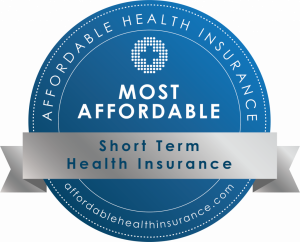Find Affordable Short-term Health Insurance
If you’re in between affordable health insurance coverage, a short-term health insurance plan can bridge the gap.

TABLE OF CONTENTS
- I. What You Should Know About Short-term Health Insurance Plans
- II. How We Rate Health Insurance Companies
- III. What Is the Best Short-term Health Insurance?
- IV. Everest Re Short-term Health Insurance: Best for affordability
- V. IHC Health Group Short-term Health Insurance: Best availability
- VI. National General Short-term Health Insurance: Best for covered benefits
- VII. Pivot Health Short-term Health Insurance: Best for low-cost deductible
- VIII. UnitedHealthcare Short-term Health Insurance: Best overall short-term insurance
- IX. How to Compare Short-term Health Insurance Companies
- X. Sources

Short-term health insurance offers coverage for a short time, usually between one month and a year. Enrollment is open all year, allowing you to start a plan any time you may need to bridge a gap in your insurance coverage. Short-term insurance plans tend to offer a lower monthly premium but more limited coverage.
Compare the top five companies with short-term health insurance, their ratings, and the benefits and drawbacks associated with each.
Get temporary short-term health insurance. Apply and enroll in under 5 minutes.
What You Should Know About Short-term Health Insurance Plans
- Temporary coverage: Short-term medical insurance can cover a lapse in major health insurance coverage, such as when you’re between jobs, are waiting on the Open Enrollment Period, or are waiting for Medicare coverage to kick in. You don’t need a Special Enrollment Period to sign up for short-term coverage. This type of insurance isn’t intended to have a long coverage period, and some states limit how long you can carry a short-term health insurance plan.
- Limited coverage: Short-term health insurance isn’t comprehensive medical insurance. Typically, it excludes coverage for preexisting medical conditions, mental health care, pregnancy, and other conditions. Short-term plans may not cover preventive care or prescriptions and may have waiting periods for some benefits.
- No ACA compliance: Short-term medical plans aren’t required to meet ACA standards. That affects what your plan covers because it doesn’t have to offer minimum essential coverage. It also means short-term plans don’t count as qualifying prior coverage if you want to enroll in a long-term ACA plan.
- Premiums are lower than long-term plans: Although short-term coverage is lower than a traditional health plan, monthly premiums are lower too.
| Health Insurance Company | Financial Strength Rating | Customer Satisfaction Rating | Value Rating | Coverage Rating | Overall Rating |
|---|---|---|---|---|---|
| Everest Re: Best for affordability | 5 | 5 | 4 | 3 | 4.3 |
| IHC Health Group: Best availability | 4.3 | 3 | 4 | 4 | 3.8 |
| National General: Best for covered benefits | 5 | 5 | 4.5 | 4 | 4.6 |
| Pivot Health: Best for coverage options | 5 | 3 | 3.5 | 4 | 3.9 |
| UnitedHealthcare: Best provider network | 4.3 | 5 | 4.5 | 4 | 4.4 |
How We Rate Health Insurance Companies
- Financial strength: The financial strength rating is based on the insurance company’s A.M. Best financial strength rating. A.M. Best is a credit rating agency specializing in the insurance industry, which rates an insurer’s ability to meet ongoing obligations.
- Customer satisfaction: The customer satisfaction rating takes into account Kaiser Permanente’s Better Business Bureau (BBB), National Committee for Quality Assurance (NCQA), and Consumer Affairs ratings. These ratings are calculated using customer complaints and satisfaction ratings.
- Value: The value rating calculates an insurer’s overall value based on monthly premium, annual deductible, office visit cost, emergency room (ER) visit cost, and annual maximum out-of-pocket cost.
- Coverage: The coverage rating considers the insurer’s availability of coverages, plan types, and network size.
What Is the Best Short-term Health Insurance?
Short-term health insurance plans are designed to cover you for a limited period, usually from a month to a year. Short-term plans fill a gap in coverage from job loss, life changes, change of employment, a move, or any other event that causes you to lose your insurance temporarily.
Is short-term health insurance cheaper than other plans?
Short-term health insurance plans are cheaper than standard health insurance, but they don’t offer the same benefits. Monthly premiums vary based on your age, location, insurer, and coverage needs.
How long can short-term health insurance plans last?
Short-term health insurance usually lasts anywhere from a month to a year. Still, some plans can last for up to three years with renewals depending on state regulations and your insurance company’s regulations.
What are the limitations of short-term health insurance?
Short-term health insurance doesn’t have to cover essential health benefits. The ACA doesn’t require short-term plans to cover essential health benefits, such as maternity care, mental health care, preventive care, prescription drugs, and preexisting conditions. The plans may also limit the amount paid for certain services.
As the name implies, short-term health insurance lasts for a limited time. Depending on your insurance company and state laws, you may not have much time before a short-term plan runs out.
Everest Re Short-term Health Insurance: Best for affordability

Everest Re Health Insurance Overview
| Company founded | 1973 |
| Coverage area | Available in a limited number of states |
| A.M. Best rating | A+ |
| BBB rating | A+ |
| NCQA accreditation | No |
| NCQA rating | N/A |
| Preexisting condition coverage | No |
| Discount program | No |
| Prescription coverage | No |
| Preventive coverage | No |
| Provider network | A large number of medical providers but no network requirement |
Everest Re provides some of the lowest-cost programs in the short-term health insurance field with a wide range of deductibles. Its programs are only available in a limited number of states.
Is Everest Re a Good Insurance Provider?
| What we like about Everest Re short-term insurance plans: | The drawbacks of Everest Re short-term insurance plans: |
|---|---|
|
|
How Is Everest Re Rated?
When you’re searching for the right short-term insurance plan to suit your situation, trusted ratings and reviews can help you make better, wiser choices. See how we rated Everest Re:
Overall rating: 4.3
| Financial strength rating: 5 |
Customer satisfaction rating: 5 |
Value rating: 4 |
Coverage rating: 3 |
IHC Health Group Short-term Health Insurance: Best availability

IHC Health Group Health Insurance Overview
| Company founded | 1975 |
| Coverage area | Operating in 35 states |
| A.M. Best rating | A- |
| BBB rating | F |
| NCQA accreditation | No |
| NCQA rating | N/A |
| Preexisting condition coverage | No |
| Discount program | No |
| Prescription coverage | Yes |
| Preventive coverage | Yes |
| Provider network | A large number of medical providers with in-network and out-of-network options |
Independence Holding Co. (IHC) Health Group offers insurance plans nationwide, but state laws dictate where short-term health insurance is available. Check with your state’s laws to see if IHC short-term insurance is an option for you. IHC offers benefits not available in other short-term insurance plans, such as diagnostic tests and X-rays.
Is IHC a Good Insurance Provider?
| What we like about IHC short-term insurance plans: | The drawbacks of IHC short-term insurance plans: |
|---|---|
|
|
How Is IHC Health Rated?
When you’re searching for the right short-term insurance plan to suit your situation, trusted ratings and reviews can help you make better, more intelligent choices. See how we rated IHC:
Overall rating: 3.8
| Financial strength rating: 4.3 |
Customer satisfaction rating: 3 |
Value rating: 4 |
Coverage rating: 4 |
National General Short-term Health Insurance: Best for covered benefits

National General Health Insurance Overview
| Company founded | 1920 |
| Coverage area | Available in 34 states and Washington, D.C. |
| A.M. Best rating | A+ |
| BBB rating | A+ |
| NCQA accreditation | No |
| NCQA rating | N/A |
| Preexisting condition coverage | No |
| Discount program | No |
| Prescription coverage | Yes |
| Preventive coverage | No |
| Provider network | Large |
National General offers short-term insurance plans that include ambulance coverage, urgent care, emergency room visits, and some preventive care. In business for more than 100 years, the company is in a strong financial position with an excellent rating from A.M. Best and has a good customer service rating, earning an A+ with the BBB. National General’s network options provide broad coverage while traveling. Be sure to check all National General options carefully before making your decision.
Is National General a Good Insurance Provider?
| What we like about National General short-term insurance plans: | The drawbacks of National General short-term insurance plans: |
|---|---|
|
|
How Is National General Health Rated?
When you’re searching for the right short-term insurance plan to suit your situation, trusted ratings and reviews can help you make better, smarter choices. See how we rated National General:
Overall rating: 4.6
| Financial strength rating: 5 |
Customer satisfaction rating: 5 |
Value rating: 4 |
Coverage rating: 4 |
Pivot Health Short-term Health Insurance: Best for low-cost deductible

Pivot Health-Health Insurance Overview
| Company founded | 2015 |
| Coverage area | Available in 26 states and Washington, DC |
| A.M. Best rating | A+ |
| BBB rating | C |
| NCQA accreditation | No |
| NCQA rating | N/A |
| Preexisting condition coverage | No |
| Discount program | No |
| Prescription coverage | Yes |
| Preventive coverage | Yes |
| Provider network | Large, but some plans have options for using any doctor you want |
Pivot Health has various short-term health plans, including plans that allow you to choose any medical provider that accepts your plan. In addition to prescription coverage, Pivot Health’s short-term insurance plans offer a telemedicine plan, which is unique among its competitors. The telemedicine plan allows you to speak to a medical professional whenever you need to.
Is Pivot Health a Good Insurance Provider?
| What we like about Pivot Health short-term insurance plans: | The drawbacks of Pivot Health short-term insurance plans: |
|---|---|
|
|
How Is Pivot Health Rated?
When you’re searching for the right short-term insurance plan to suit your situation, trusted ratings and reviews can help you make more informed choices. See how we rated Pivot Health:
Overall rating: 3.9
| Financial strength rating: 5 |
Customer satisfaction rating: 3 |
Value rating: 3.5 |
Coverage rating: 4 |
UnitedHealthcare Short-term Health Insurance: Best overall short-term insurance

UnitedHealthcare Health Insurance Overview
| Company founded | 1977 |
| Coverage area | Short-term insurance plans are available in 19 states |
| A.M. Best rating | A- |
| BBB rating | A+ |
| NCQA accreditation | Yes |
| NCQA rating | 4.5 to 2.5 |
| Preexisting condition coverage | No |
| Discount program | Yes |
| Prescription coverage | Yes |
| Preventive coverage | Yes |
| Provider network | 1.3 million physicians and care professionals
6,500 hospitals and care facilities nationwide |
UnitedHealthcare offers short-term health insurance plans with a range of benefits such as dental coverage and prescription drug coverage. Short-term plans are available in 19 states with broad access to UnitedHealthcare’s large provider network.
Is UnitedHealthcare a Good Insurance Provider?
| What we like about UnitedHealthcare short-term insurance plans: | The drawbacks of UnitedHealthcare short-term insurance plans: |
|---|---|
|
|
How Is UnitedHealthcare Rated?
When you’re searching for the right short-term insurance plan to suit your situation, trusted ratings and reviews help you make better, smarter choices. See how we rated UnitedHealthcare:
Overall rating: 4.4
| Financial strength rating: 4.3 |
Customer satisfaction rating: 5 |
Value rating: 4.5 |
Coverage rating: 4 |
How to Compare Short-term Health Insurance Companies
It’s always worth it to compare your options for short-term health insurance. Coverage choices vary, and the plan you choose matters, even if it’s just for a short time. Take these steps to determine which short-term health insurance plan is the best for you:
- Find plans available in your area: Not every short-term health plan is available nationwide. Check with each insurer for availability where you live.
- Research the network: Some short-term health insurance plans offer you the choice of using only in-network providers, plans that include out-of-network providers and plans that have no network requirements at all. Find network options that suit both your financial situation and your health.
- Research prescription drug coverage: Many short-term health insurance plans provide prescription drug coverage, but not all do. When looking into a short-term health insurance plan, ask about its prescription drug policy, whether it’s provided in the coverage or if you must buy a supplemental plan.
- Compare deductibles: Your health situation will dictate the kind of deductible you should choose. If you don’t plan on major health expenses during your short-term plan coverage period, a high-deductible plan may be appropriate. But if you expect you’ll need significant coverage, a lower-deductible plan could help you save, even if the premium is higher.
- Compare copays: What’s true for deductibles is also true for copays. If you plan to see a doctor and get care, it may be worth paying more for a plan that can offer low copays.
- Research dental coverage: Dental is an added benefit that you may or may not need. Find out if the plans you’re considering have this benefit.
- Check insurer ratings: You want to work with an insurance company in a strong financial position that’s highly rated by consumers. Ratings can give you the confidence of knowing that the health care coverage you’ve purchased will be reliable.

Tammy Burns is an experienced health insurance advisor. She earned her nursing degree in 1990 from Jacksonville State University, obtained her insurance billing and coding certification in 1995, and holds a health and life insurance license in Alabama, Georgia, Iowa, Mississippi, and Tennessee. Burns is Affordable Care Act (ACA)-certified for health insurance and other ancillary, life, and annuity products. She maintains an active nursing license and practices private-duty nursing.
Burns’ background as a nurse, insurance biller and coder, and insurance consultant includes infectious disease, oncology, gynecology, phlebotomy, post operative, family medicine, geriatrics, home health, hospice, human resources, management, billing, coding, claims, fixed annuities, group and individual health and life products, and Medicare. She’s always been driven by a desire to help people, spending more than 25 years as a practicing nurse in hospitals, private doctors’ offices, home health, and hospice. As a nurse, Burns supported patients filing insurance claims with Medicare, Medicaid, and private insurance companies as well as responding to billing questions from confused patients.
Seeing firsthand how unsuspecting patients are frequently confused by an overly complex system they don’t understand led Burns to become an insurance agent and health care consultant, now helping people understand the medical system. Since becoming an insurance agent in 2013, she has worked with some of the largest and most reputable insurance carriers and agencies in the nation, and she has built a large and loyal clientele by way of her commitment to transparency and personalized service.

Tammy Burns is an experienced health insurance advisor. She earned her nursing degree in 1990 from Jacksonville State University, obtained her insurance billing and coding certification in 1995, and holds a health and life insurance license in Alabama, Georgia, Iowa, Mississippi, and Tennessee. Burns is Affordable Care Act (ACA)-certified for health insurance and other ancillary, life, and annuity products. She maintains an active nursing license and practices private-duty nursing.
Burns’ background as a nurse, insurance biller and coder, and insurance consultant includes infectious disease, oncology, gynecology, phlebotomy, post operative, family medicine, geriatrics, home health, hospice, human resources, management, billing, coding, claims, fixed annuities, group and individual health and life products, and Medicare. She’s always been driven by a desire to help people, spending more than 25 years as a practicing nurse in hospitals, private doctors’ offices, home health, and hospice. As a nurse, Burns supported patients filing insurance claims with Medicare, Medicaid, and private insurance companies as well as responding to billing questions from confused patients.
Seeing firsthand how unsuspecting patients are frequently confused by an overly complex system they don’t understand led Burns to become an insurance agent and health care consultant, now helping people understand the medical system. Since becoming an insurance agent in 2013, she has worked with some of the largest and most reputable insurance carriers and agencies in the nation, and she has built a large and loyal clientele by way of her commitment to transparency and personalized service.
Sources
- Healthcare.gov Glossary | Affordable Care Act (ACA) | Last accessed July 2025
- Healthcare.gov |The Children’s Health Insurance Program (CHIP) | Last accessed July 2025
- HealthCare.gov | The ‘metal’ categories: Bronze, Silver, Gold & Platinum | Last accessed July 2025
- KFF | Health Insurance Coverage of the Total Population | Last accessed July 2025
- Medicaid.gov | Medicaid | Last accessed July 2025
- Medicare.gov | Medicare | Last accessed July 2025
- Medicare.gov | Part A & Part B sign up periods | Last accessed July 2025
